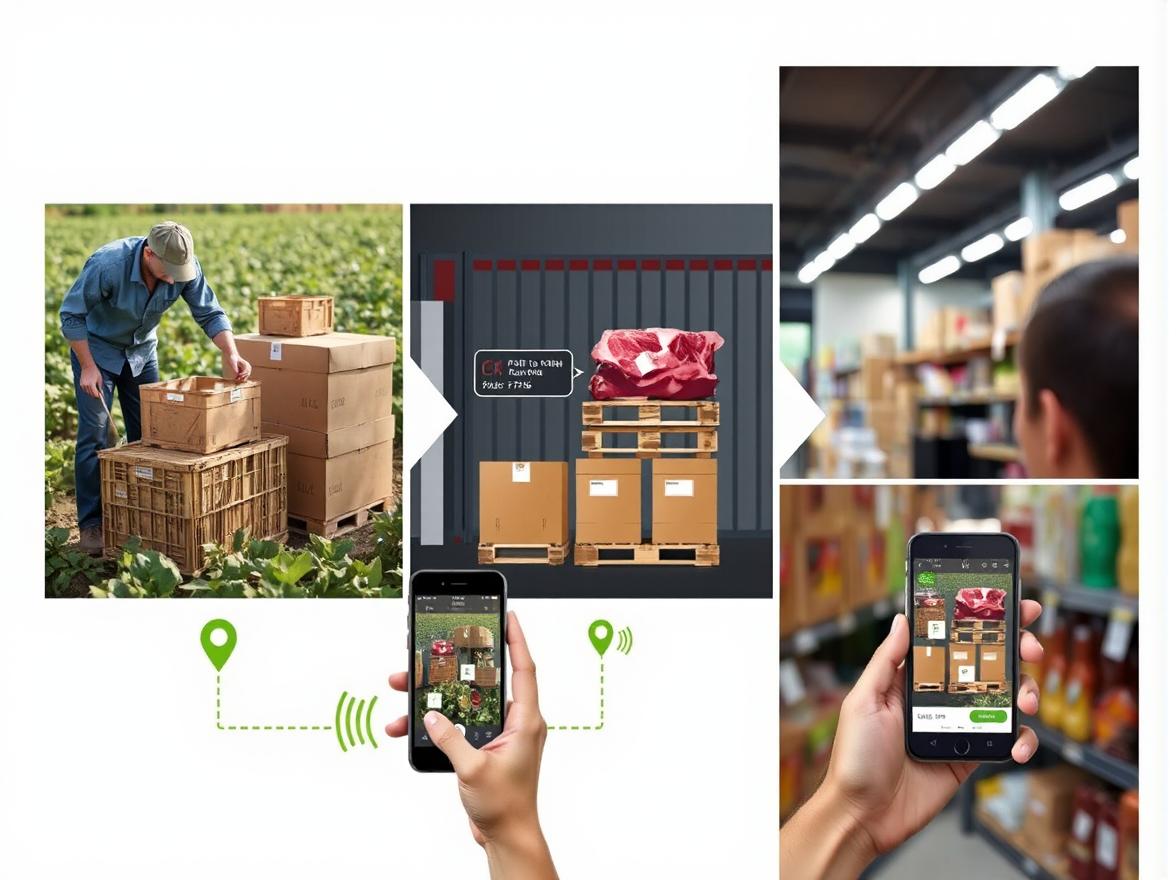In modern agriculture, food safety, resource management and supply chain transparency are increasingly becoming the focus of industry attention. With consumers' growing concern for food safety, ensuring that agricultural products can be traced back to their source has become a pressing issue for agribusinesses.RFID (Radio Frequency Identification) technology provides an efficient and reliable solution to these issues. This paper will explore the application of RFID tags in the tracking and tracing of agricultural products and its impact on agricultural supply chain management.
RFID technology, which uses radio waves to automatically identify and track tags attached to objects, is widely used in a number of industries. In agriculture, RFID tags are used to track every aspect of agricultural products, from production, processing, transportation to distribution, ensuring that each step provides real-time, accurate data.
RFID systems consist of three main components: tags, readers and databases. The tag stores key information about the product, and the reader reads the tag data via radio waves and transmits it to a central database for storage and analysis. Unlike traditional bar code systems, RFID does not require manual scanning and therefore can greatly improve the efficiency of data collection.
One of the primary functions of RFID in the agricultural supply chain is enhancing traceability and transparency. Every step, from the field to the consumer’s table, can be recorded in real time through RFID tags, allowing consumers to easily access detailed product information.
Inventory Management and Monitoring: By attaching RFID tags to agricultural products, companies can monitor inventory levels in real time, reducing human error and delays in data updates, and ensuring accurate inventory records.
Transportation and Logistics Monitoring: RFID not only tracks the location of goods but also monitors environmental conditions such as temperature and humidity during transport, helping ensure that products meet required standards.

Food safety is a critical concern in agricultural production. RFID provides a complete traceability chain, effectively ensuring food quality and safety.
Accurate Product Traceability: RFID tags record data at each stage, including production dates and storage locations. Consumers can scan the tag to obtain detailed product history, making the source of food clear and preventing fraud or quality issues.
Monitoring Storage and Transport Conditions: Agricultural products often require specific temperature and humidity conditions during storage and transport. Combined with sensors, RFID tags can continuously monitor and log these conditions, alerting relevant personnel when anomalies occur.
Rapid Response to Food Safety Incidents: In the event of a food safety issue, RFID enables quick identification of the source and facilitates targeted recalls, minimizing risks to consumers.
Enhancing Supply Chain Transparency and Efficiency
Beyond traceability, RFID improves the overall transparency and efficiency of the agricultural supply chain.
Real-Time Data Collection and Analysis: RFID tags provide instant feedback on inventory status and logistics progress, reducing manual entry errors and increasing visibility across the supply chain.
Automated Inventory Management: With RFID systems, farms and warehouses can automatically update inventory data, reducing labor needs and saving time and costs.
Reduced Waste and Losses: RFID helps optimize inventory management by reducing overstocking and stockouts, avoiding unnecessary waste, and improving product turnover and profitability.
Many agricultural enterprises have already adopted RFID technology with notable success. Here are some typical use cases:
Livestock Management: Some farms use RFID tags to track the health, growth, and production history of individual animals. This enhances management efficiency and allows for timely responses to changes in animal conditions.
Agricultural Traceability: Farms attach RFID tags to each batch of produce, enabling full traceability from the field to the market. This ensures food safety and builds consumer trust in the brand.
Farm Equipment Management: RFID tags can also be attached to tools and equipment to prevent loss and misuse, while enabling easy tracking of usage and maintenance history, thus extending their lifespan.
Although RFID brings many benefits to agriculture, there are still challenges in its implementation.
Initial Investment Cost: The upfront cost of setting up an RFID system can be high, especially for small-scale farms. To reduce this burden, phased implementation and gradual expansion can be considered.
Technical Issues: RFID performance can be affected by environmental factors such as metal or liquid interference. Selecting specialized RFID tags suitable for farm environments and optimizing system settings can help overcome these issues.
Training Needs: Employees need training to operate and maintain RFID equipment properly. Regular training and technical support can help them adapt more quickly.
As RFID technology continues to evolve, its applications in agriculture will become more intelligent and widespread. In the future, RFID tag costs are expected to decrease further, while read range and speed improve. Moreover, integrating RFID with IoT (Internet of Things) and blockchain technologies will enhance the intelligence and transparency of agricultural supply chains.
Combined with IoT devices, farms can monitor environmental changes in real time, such as temperature and humidity, and predict demand based on data analytics. Meanwhile, blockchain ensures data integrity, further building consumer confidence in agricultural products.
The application of RFID tags in agricultural product tracking and traceability has significantly improved the transparency, efficiency, and food safety of the supply chain. Through RFID technology, farms can achieve more precise inventory control, better resource allocation, and stronger food safety assurance. As technology advances, RFID will play an increasingly important role in the digital and intelligent transformation of modern agriculture. Agricultural enterprises should actively adopt RFID solutions to enhance competitiveness and embrace a more transparent and efficient future.
Do you need a professional team to provide you with solutions? Contact us for a quote
Let us discuss it with you.